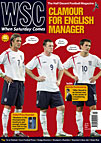 Update on clubs in crisis from Tom Davies
Update on clubs in crisis from Tom Davies
You can tell a club is in trouble if fans protest throughout a 5-1 home win, as Derby’s did during last month’s thrashing of Crewe at Pride Park. Supporter protests against a board of directors presiding over a debt thought to be more than £44 million and the inevitable depletion of playing resources that has entailed have escalated in recent weeks and many fear for the club’s existence, especially if they are relegated. Subsequent embarrassing defeats by Coventry and Colchester will scarcely have improved morale and led to the dismissal of manager Phil Brown late last month.
The current board – John Sleightholme, Jeremy Keith, Murdo Mackay, Andrew Mackenzie and Steve Harding – took over in 2004 after Lionel Pickering stepped down, with Derby’s turn-of-the- century attempts at dream-living in the Premiership having foundered in relegation and debts of £30m. Since then losses have continued to grow even as a steady stream of promising players, such as Grzegorz Rasiak and Tom Huddlestone, have departed, and fans are questioning the stewardship of a board whose aims remain unclear and who have not revealed any sort of business plan since taking over.
Of added concern is the role of the mysterious Panama-registered ABC Corporation, which now owns the mortgage on Pride Park, having acquired it in a £15m deal negotiated with Derby’s bank, the Co-op, as it sought to reduce the club’s debts. ABC will be familiar to fans of QPR, who are also in hock to the corporation after it lent them £10m to bail them out of administration in 2002. The ten per cent annual interest on that loan remains a hefty burden at Loftus Road.
The ABC deal has also engendered ill-feeling towards the Co-op in Derby (one of its branches was daubed in graffiti a day after the Coventry mauling, an act condemned by fans’ groups), with supporters questioning why the “ethical bank” was doing business with such an unaccountable corporation.
So with supporters sidelined and major alternative investors not in evidence, pessimism is in the air. “It looks like the only way we can get rid of the current board is by going into administration, which means guaranteed relegation and the possible loss of the ground,” says Nick Sellars of the Rams Trust. “In that situation, who would want to buy the club?”
No such debt mountain looms over Lincoln City, who have consistently generated an operating surplus since becoming a supporter-led “community club”. But paradoxically this very success seems to be making them vulnerable to outside predators, as a bizarre sequence of events over the new year demonstrated. Keith Alexander, who has taken the Imps to the fourth division play-offs three times, and his assistant Gary Simpson were suspended by the club on January 2, without any clear public explanation, on vague disciplinary grounds following a board teleconference.
Within a few days, Alexander had been reinstated (though Simpson left by mutual consent) and two directors, Keith Roe and director of football Ray Trew, left instead – Trew going voluntarily and Roe voted off by the rest of the board. The supporters’ trust has a 26 per cent shareholding in Lincoln and there is no majority shareholder.
Such manoeuvring inevitably led to a fair amount of argument among supporters, but at the heart of the issue lay a stand-off between two conflicting views of football club stewardship – the more narrow business-led approach epitomised by the two departing directors, or the more democratic community-based structure favoured by the trust and the rest of the board. Alexander is back in the dugout, for now, but the recriminations have rolled on, with the ousted Roe last week calling on club chairman Steff Wright to resign, while strenuously denying that he was seeking to mount an alternative takeover. This one may run and run.
There’s been progress at Raith Rovers, where a supporter-driven buyout was completed at the turn of the year. Rovers’ situation had been parlous after the financially necessary sale and leaseback of Stark’s Park in 2003 was followed by the curious arrival of Claude Anelka, brother of Nicolas, as manager in 2004. Although Anelka did make some investment in the club – thought to be around £160,000 – the club over-reached itself in its 2004-05 budget. Anelka was sacked in October 2004 after a terrible run of results and the season ended in relegation to Division Two.
Off the field, chairman Turnbull Hutton resigned and the Raith Trust launched a campaign to buy back a controlling interest in the club. After a period of stalemate as two directors resisted offers to sell up, the Reclaim the Rovers campaign cranked up its fundraising and publicity, raising £100,000 off its own back and securing backing from supportive directors and investors. A deal was eventually struck at the end of December.
This leaves Reclaim the Rovers (a coalition of several supporters groups) with a stake of around 15 per cent in the club, and the ground and club now in the same hands. Finances remain tight, but Rovers supporters can at least look ahead with a modicum of optimism.
From WSC 229 March 2006. What was happening this month